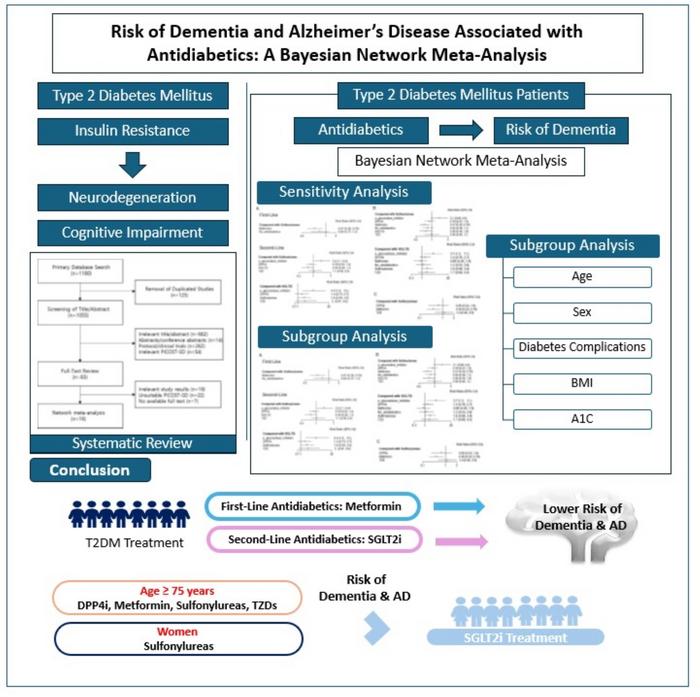Ann Arbor, July 11, 2024 – Investigators analyzing the potential cognitive effects of antidiabetic medications in records of more than 1.5 million patients with type 2 diabetes mellitus (T2DM) found risks of dementia and Alzheimer’s disease (AD) were significantly lower in patients treated with metformin and sodium glucose co-transporter-2 inhibitors (SGLT-2i) compared to other antidiabetic drugs. Their results appear in the American Journal of Preventive Medicine, published by Elsevier.

Credit: American Journal of Preventive Medicine
Ann Arbor, July 11, 2024 – Investigators analyzing the potential cognitive effects of antidiabetic medications in records of more than 1.5 million patients with type 2 diabetes mellitus (T2DM) found risks of dementia and Alzheimer’s disease (AD) were significantly lower in patients treated with metformin and sodium glucose co-transporter-2 inhibitors (SGLT-2i) compared to other antidiabetic drugs. Their results appear in the American Journal of Preventive Medicine, published by Elsevier.
T2DM has become a critical health issue, affecting around 530 million patients worldwide. Growing evidence demonstrates there is at least a 50% increased risk of cognitive impairment and dementia in patients with T2DM, manifested as impaired executive function, memory, and attention. Dementia itself is also a crucial health issue, affecting more than 40 million patients worldwide.
Lead investigator Yeo Jin Choi, PharmD, PhD, Department of Pharmacy, College of Pharmacy; Department of Regulatory Science, Graduate School; and Institute of Regulatory Innovation Through Science (IRIS), Kyung Hee University, Seoul, Korea, explains, “As the prevalence of both diabetes and dementia continues to rise each year, and with mounting evidence suggesting a strong correlation between diabetes and dementia, the need for comprehensive research in dementia risk associated with antidiabetic treatment becomes increasingly imperative. Understanding the potential cognitive effects of antidiabetic medications is not only crucial for optimizing patient care but also for informing regulatory decisions and clinical practice guidelines to prioritize patient safety and promote public health.”
Investigators searched the Cochrane Central Register of Controlled Trials, Embase, MEDLINE (PubMed), and Scopus from inception to March 2024 to identify observational studies investigating incidence of dementia and AD in patients after initiation of antidiabetic drugs. A total of 1,565,245 patients from 16 studies were included. They performed Bayesian network meta-analysis to determine the risk of dementia and AD associated with antidiabetics and synthesized data to compare the risk of dementia and AD associated with six antidiabetic drug classes: DPP4 inhibitors, metformin, SGLT-2 inhibitors, sulfonylureas, alpha-glucosidase inhibitors, and thiazolidinediones.
Earlier studies had suggested an increased risk of dementia from the use of antidiabetic drugs, particularly with agents with high hypoglycemic risks, such as sulfonylurea and alpha-glucosidase inhibitors. The evidence regarding dementia risk associated with SGLT-2 inhibitors was limited prior to this study.
The lowest risk of dementia and AD in this novel study was found in patients on metformin. In addition, SGLT-2 inhibitors, which include Farxiga® and Jardiance®, were associated with a lower risk of dementia and AD as well as cardiovascular health benefits.
Dementia risk associated with SGLT-2 inhibitors was similar to other antidiabetic medications in patients less than 75 years of age. However, the risk of dementia was substantially higher with dipeptidyl peptidase IV (DPP4) inhibitors, metformin, sulfonylureas, and thiazolidinedione (TZD) compared to SGLT-2 inhibitors in patients aged 75 years or older. Dementia risk was also significantly lower with SGLT-2 inhibitors compared to sulfonylureas in women.
The investigators note that dementia and AD risks associated with second- or third-line antidiabetics, including GLP-1 agonists and insulin, were not evaluated in this study.
This research contributes to a more comprehensive understanding of diabetes management, emphasizing the importance of considering both metabolic and cognitive health outcomes in clinical practice. It highlights the importance of individualized treatment approaches in diabetes management, taking into account patient-specific factors such as age, sex, complications, body mass index (BMI), glycated hemoglobin (A1C), which measures blood glucose levels over the previous three months, and cognitive health status, informing healthcare professionals in their decision-making process when selecting appropriate treatment options for patients with diabetes.
Yeo Jin Choi concludes, “We were quite surprised by the study results, particularly the potential cognitive benefits of SGLT-2 inhibitors over metformin and DPP-4 inhibitors in patients aged 75 years or older. This finding is particularly notable given that SGLT-2 inhibitors are currently used for heart failure management as well. Our study contributes to the existing evidence by suggesting potential additional benefits of SGLT-2 inhibitors in mitigating dementia risk, thereby providing significant clinical implications for diabetes management. Elderly patients aged 75 years or older may particularly benefit from these findings, since they often face greater cognitive health concerns.”
Journal
American Journal of Preventive Medicine
DOI
10.1016/j.amepre.2024.04.014
Method of Research
Meta-analysis
Subject of Research
People
Article Title
Risk of Dementia and Alzheimer’s Disease Associated With Antidiabetics: A Bayesian Network Meta-Analysis





